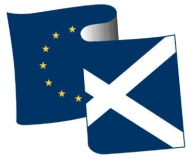 For some people this may be a statement of the bleeding obvious, but listening to BBC Radio 4 Today this morning, it seems the media is using the Scottish independence campaign to test out which arguments should be made and lines taken in any future EU referendum campaign (whenever that might be).
For some people this may be a statement of the bleeding obvious, but listening to BBC Radio 4 Today this morning, it seems the media is using the Scottish independence campaign to test out which arguments should be made and lines taken in any future EU referendum campaign (whenever that might be).
Professor John Curtice, wearing his ScotCen Social Research hat, has told the BBC that:
Voters want to hear about the economic and financial consequences of the choice that they make, and it is on the outcome of that debate that the result of the referendum is likely to turn.
This is hardly as surprise when the questions asked focus on economic rather than political matters.
A write up of the story on BBC Online also extracts specific questions that focus on voting intentions based on whether Scots will be £500 better or worse off after independence, or whether the Scottish economy will be better or worse. There is no report on the all-important political factors, which is what the independence debate (and the EU debate for that matter) is all about.
It is important to note that the Today piece included comments from four Scots voters – and only one of them said financial considerations were an important factor to him when it comes to voting on independence. The other three didn’t focus on economics and instead spoke about variations on the theme of who decides how Scotland is run. Once this segment had been played, the presenter then ignored the voter contributions and turned the discussion straight back to economics, disregarding what the voters had said; and Curtice himself then introduced identity as an issue rather than politics, to move the conversation further away from the central political dimension.
The feeling is of there being a clear agenda to frame the Scottish debate firmly in terms of economics, while doing everything possible to confine the politics to the wilderness. While this mirrors the current approach taken to the EU debate by the Europhiles at places such as the Centre for European Reform and the Europlastics at places such as Open Europe, what it does is enable the power of the narrative to be tested on a live electorate and see how effectively the electorate can be manipulated into focusing on issues that are irrelevant to the concept of independence – namely who should run Scotland.
No matter whether one feels the Scots should be independent, or whether the union should be preserved as it is, all should be concerned that the crux of the independence issue is being airbrushed from the discourse by the media, which is taking its line from entities with vested interests in keeping all structures as they are – which suits the European Union perfectly.








The debate up here actually hasn’t been as bad as all that, I think we are now up to our 4 televised debate, we had 3 before SNP put out their policy document to the point where I think most people, (zealots not included) have been ground down by the tedium.
Though that Salmond had spent years banging on and did not (and still doesn’t in my view) have a clear vision on how to deliver it is quite surprising and detrimental, and from from what I read has clear resonance for Farage.
Another observation is that Yes has been far better at putting their differences to one side to get on with the task at hand, No seems too fractured along party lines to work coherently in getting its message across.
I would say a major weakness in the Independence cause is Holy-rood itself, a single chamber with an utterly entrenched party system is not really what you want for a National Parliament, and while its increasingly hard to big up Westminster, Hansard for that is far more navigable.
It would make sense in any referendum concerning governance to inform and educate to voters as to how the systems ‘work’. That is not happening, and I suspect ALL the parties have a vested interest in sweeping it under the carpet.
“variations on the theme of who decides how Scotland is run”
The choices being, of course, the European Commission or, on the other hand, the European Commission.
The impression I get is that Salmond isn’t serious about independence.
He wants to be independent within the EU or have Devo Max, which is a quasi-independent, have your cake and eat it version. Superficially, it looks very similar to the Tories claimed position of being a member of the EU but choosing the bits we like. In both cases it’s being made pretty clear that the SNP or the Tories, won’t be allowed to call the shots exactly as they please.
As Will Rees says above – and this is not altogether to do with economics – people reasonably expect a significant move like this to be thought through, so that things don’t suddenly stop working because their legal basis has just disappeared. This is something people wanting the UK to leave the EU also have to address.
People don’t like a huge step in the dark.
It may not be a thing which can be decided on economic grounds, being £500 a year better off say, but on the other hand, raw emotionalism on its own is unlikely to be enough either.